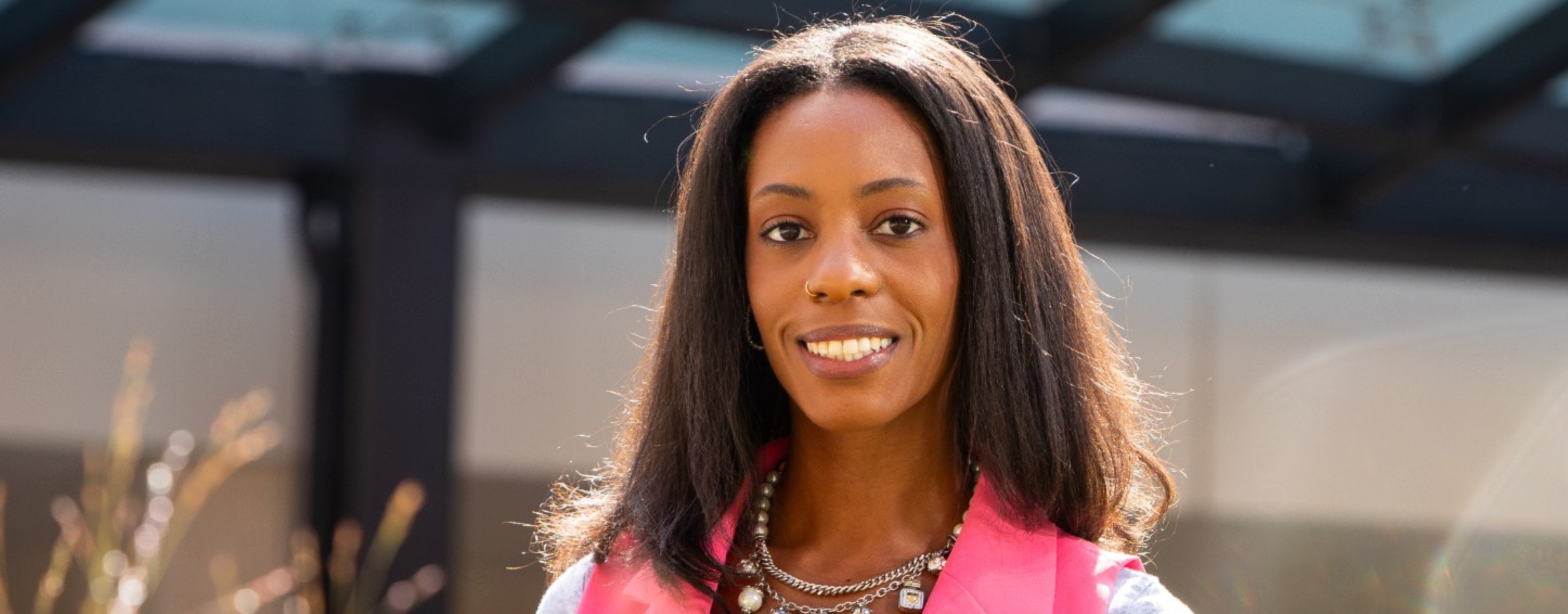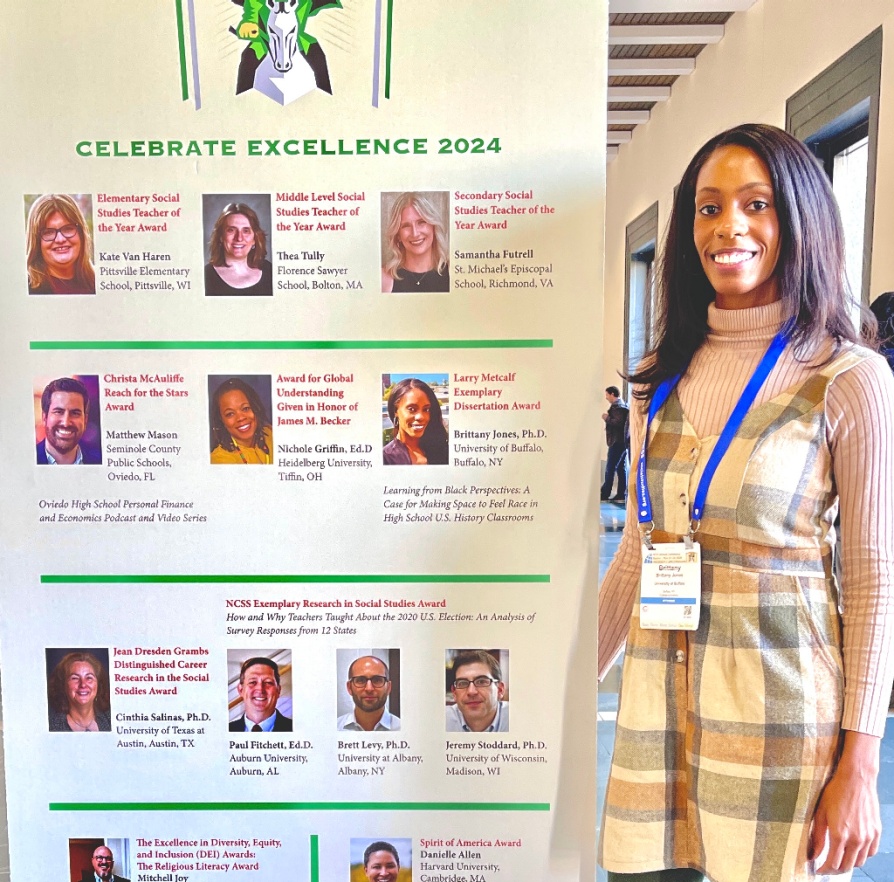
Brittany Jones, PhD, assistant professor in the Department of Learning and Instruction, has gained national acclaim for her work in anti-racism.
Published February 20, 2025
BY NICOLE MEHLMAN-DAVIDOW
GSE scholar’s anti-racism research draws national acclaim
2024 brought critical acclaim to the University at Buffalo Graduate School of Education’s assistant professor Brittany Jones, PhD, and her research on anti-racist social studies teacher education. Her dissertation titled, “Learning from Black Perspectives: A Case for Making Space to Feel Race in High School U.S. History Classrooms,” has received two nationally recognized awards from both the American Educational Research Association (AERA) and the National Council for Social Studies (NCSS).

Brittany Jones, PhD, presents her research.
Accounting for emotions towards history
Jones’ dissertation was intergenerational in nature. She interviewed and compiled Black students’ feelings and emotional responses toward historical topics along with the feelings and emotions of their caregivers. “Part of my dissertation looked at the ways in which Black students understand Black activism and resistance, particularly around the civil rights movement, as well as how they felt when learning these histories,” explained Jones. “I replicated that same study with their caregivers, but this time, I was really focusing on their feelings and attitudes towards what their children were learning.”
This aspect of incorporating caregivers into the study was a new approach to understanding how emotions play into learning and how parents' and caregivers’ feelings towards the same topics could influence a student’s learning. “A lot of times, we don't think about the ways in which our emotions inform how we understand various topics and our perspectives about different issues within society,” said Jones.
“I think the implications are even greater, particularly given our political climate, where lawmakers are trying to prohibit education about race and racism. Through my research, I found that the students and their caregivers are talking about the importance of learning about race, racism, anti-Blackness, so there's this real tension happening.”
What stood out most to Jones was that Black students and their caregivers’ emotions played a huge part in how the students perceived and interpreted historical events. “What my dissertation revealed was that the emotions the students felt from living in an anti-Black society really informed how they made sense of the past and the present.”
While Jones was studying at Michigan State, her advisor Anne-Lise Halvorsen, PhD, noticed her student’s dissertation was unique. It was Halvorsen who nominated Jones’ research for the AERA and NCSS awards. “The study wasn’t just innovative; it could have future implications that would impact education methods, pedagogy and policy broadly,” explained Jones. “It also was generational in nature, allowing for multiple perspectives to be amplified, which I think set my dissertation apart.”
Difficult-ish
Jones is looking to expand on her dissertation and begin to seek solutions towards different approaches to anti-racist education in social studies. As her work has gained notoriety at national conferences, her colleagues, peers and other researchers have taken notice.
Through AERA, Jones drew the attention of Cathryn van Kessel, PhD, and Kimberly Edmondson, PhD candidate, who were in the process of writing their book, “Teaching Villainification in Social Studies: Pedagogies to Deepen Understanding of Social Evils.” Jones wrote a chapter for the book, which was titled, “Removing the Binaries in History Curricula and Teacher Education: Difficult-ish as an Antidote to Villainification and Its Partner, ‘Difficult Histories’.”
Jones was inspired by one of her favorite TV shows when defining her research. “I was watching “Black-ish” one day, and I was like, ‘Oh, this will be a good title,’ and that's the backstory of how ‘difficult-ish’ came to be,” she said with a laugh.
As a doctoral student, Jones was interested in the idea of why social studies researchers were using adjectives like ‘difficult’ to describe history. “Difficult for whom is the question, and so I wanted to think more expansively about what we mean when we say difficult history,” explained Jones. “I conducted a smaller study with ten Black teachers, and I asked them, ‘Do you think these histories are difficult?’ They said no, which matters because when we denote something as difficult, it doesn’t necessarily capture everyone’s understanding.”
A three-part framework
Jones’ book chapter problematizes the term difficult and challenges researchers and educators to think about the harms of labeling history. Difficult-ish is offered as a three-part framework. “The first part pushes researchers and educators to move beyond the binary that is created by the difficult label,” explained Jones.
Secondly, Jones explains that those defining what is difficult aren’t necessarily those who are directly affected by those histories: “The voices of those impacted by difficult histories are oftentimes decentered in curricular materials, so I wondered how we might begin teaching these histories in ways that center historically marginalized people and the people who experience the consequences of difficult histories in the present.”
The third part of difficult-ish brings readers to the idea that there is growth in moving forward. “We can acknowledge our discomfort with teaching difficult histories, but we can't sit there, so the third part of difficult-ish explores how we can move past discomfort and focus on how to effectively teach these histories,” said Jones.
The future of teaching anti-racism
2024 may have brought acclaim and honors for Jones, but she has not settled. She sees a challenging future ahead for social studies educators, their students and the families of school-aged children, and she aspires to prepare social studies educators who can incorporate emotions into all aspects of social studies education. “Emotions show up everywhere—in the curriculum we teach, in the historical sources we analyze. Emotions inform how students learn, how educators teach and they even appear in educational policies—particularly in anti-CRT [Critical Race Theory] legislation—which uses terms like ‘guilt’ and ‘shame’ to rationalize banning the teaching of certain topics. But whose guilt or shame do these policies center?”
“I also want more discourse and deeper thinking around what it means to call history difficult. I often wonder what might happen if the term difficult histories was to be misconstrued and then weaponized to justify banning the teaching of certain topics,” she said.
